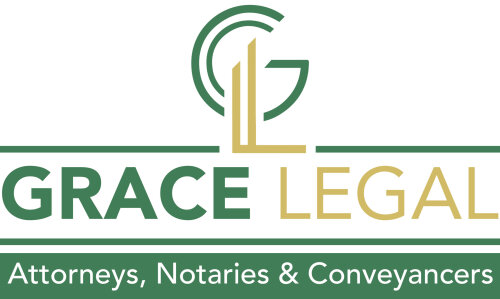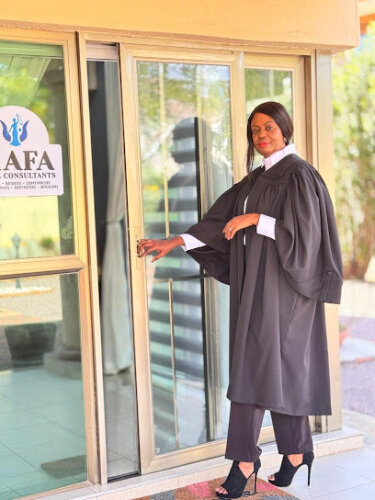Best Real Estate Lawyers in Gaborone
Share your needs with us, get contacted by law firms.
Free. Takes 2 min.
Free Guide to Hiring a Real Estate Lawyer
List of the best lawyers in Gaborone, Botswana
About Real Estate Law in Gaborone, Botswana
Gaborone, the capital city of Botswana, offers a vibrant real estate market with opportunities for residential, commercial, and industrial investments. The real estate sector in Gaborone is governed by a combination of local laws and customary practices, designed to ensure fair transactions, protect property rights, and regulate land use. Understanding these laws is crucial for anyone involved in buying, selling, leasing, or developing property in this region.
Why You May Need a Lawyer
Engaging a lawyer for real estate matters in Gaborone can be invaluable for several reasons:
1. Property Transactions: Lawyers ensure that all transactions are conducted legally and that your interests are protected.
2. Title Deeds: They can assist in verifying and transferring title deeds to confirm legitimate ownership.
3. Lease Agreements: Legal experts can draft and review lease agreements to protect landlords and tenants' rights.
4. Dispute Resolution: Lawyers can help resolve disputes regarding property boundaries, ownership claims, and other issues.
5. Development Projects: Legal assistance may be required for obtaining necessary permits and ensuring compliance with zoning laws and building regulations.
Local Laws Overview
Here are some key aspects of real estate laws relevant to Gaborone, Botswana:
1. Land Ownership: In Botswana, land can be owned either as freehold or leasehold. Freehold land is owned outright, while leasehold land is owned for a specified term under a lease agreement.
2. Deeds Registry Act: This Act governs the registration of immovable property, ensuring transparency and security in property transactions.
3. Tribal Land Act: Governs land in rural areas and is administered by Tribal Land Boards. Customary laws may also apply.
4. Town and Country Planning Act: This Act regulates land use and development within urban areas to ensure organized growth and environmental sustainability.
5. Transfer Duty Act: Requires the payment of transfer duty on the acquisition of property, which legal professionals can help calculate and process.
Frequently Asked Questions
1. Can foreigners buy property in Gaborone?
Yes, foreigners can buy property in Gaborone, but they may need to obtain approval from the Ministry of Lands and Housing.
2. What is the process of transferring property ownership?
The process involves conducting a deed search, drafting the sale agreement, paying transfer duty, and registering the transfer with the Deeds Registry.
3. Do I need a lawyer for a lease agreement?
While not legally required, it is advisable to have a lawyer draft or review lease agreements to ensure they are fair and legally binding.
4. What is a title deed?
A title deed is a legal document that proves ownership of property. It includes details about the owner and the property.
5. How are property disputes resolved?
Disputes can be resolved through negotiation, mediation, arbitration, or litigation, depending on the nature and complexity of the issue.
6. What taxes are associated with property transactions?
Property transactions may be subject to transfer duty and potentially capital gains tax on the sale of immovable property.
7. How can I verify the authenticity of a title deed?
You can verify a title deed's authenticity by conducting a search at the Deeds Registry or consulting with a legal professional.
8. What are zoning laws?
Zoning laws regulate land use and development in different areas, ensuring that property is used in a manner consistent with city planning objectives.
9. Can I subdivide my land?
Subdividing land typically requires approval from the relevant authorities, including the Ministry of Lands and Housing and the local planning authority.
10. What should I consider when buying commercial property?
Consider factors such as location, zoning regulations, potential for growth, infrastructure, and legal obligations.
Additional Resources
Here are some resources and organizations that can be helpful:
1. Deeds Registry: For verification of title deeds and registration of property transactions.
2. Ministry of Lands and Housing: Governing body for land policies, regulation, and approval for foreign purchases.
3. Botswana Housing Corporation (BHC): For information on housing developments and policies.
4. Tribal Land Boards: For matters related to tribal or customary land.
5. Local Planning Authorities: For zoning regulations and development approvals.
Next Steps
If you need legal assistance in real estate matters, consider the following steps:
1. Consultation: Schedule a consultation with a reputable real estate lawyer to discuss your specific needs.
2. Documentation: Gather all relevant documentation, such as title deeds, lease agreements, and identification documents.
3. Verification: Have your lawyer verify all documents and conduct necessary searches.
4. Legal Advice: Follow the legal advice provided by your lawyer regarding transactions, dispute resolution, or compliance with local laws.
5. Proceed with Transactions: With your lawyer’s guidance, proceed with property transactions or legal processes, ensuring all legal requirements are met.
Lawzana helps you find the best lawyers and law firms in Gaborone through a curated and pre-screened list of qualified legal professionals. Our platform offers rankings and detailed profiles of attorneys and law firms, allowing you to compare based on practice areas, including Real Estate, experience, and client feedback.
Each profile includes a description of the firm's areas of practice, client reviews, team members and partners, year of establishment, spoken languages, office locations, contact information, social media presence, and any published articles or resources. Most firms on our platform speak English and are experienced in both local and international legal matters.
Get a quote from top-rated law firms in Gaborone, Botswana — quickly, securely, and without unnecessary hassle.
Disclaimer:
The information provided on this page is for general informational purposes only and does not constitute legal advice. While we strive to ensure the accuracy and relevance of the content, legal information may change over time, and interpretations of the law can vary. You should always consult with a qualified legal professional for advice specific to your situation.
We disclaim all liability for actions taken or not taken based on the content of this page. If you believe any information is incorrect or outdated, please contact us, and we will review and update it where appropriate.
Browse real estate law firms by service in Gaborone, Botswana
Gaborone, Botswana Attorneys in related practice areas.

















